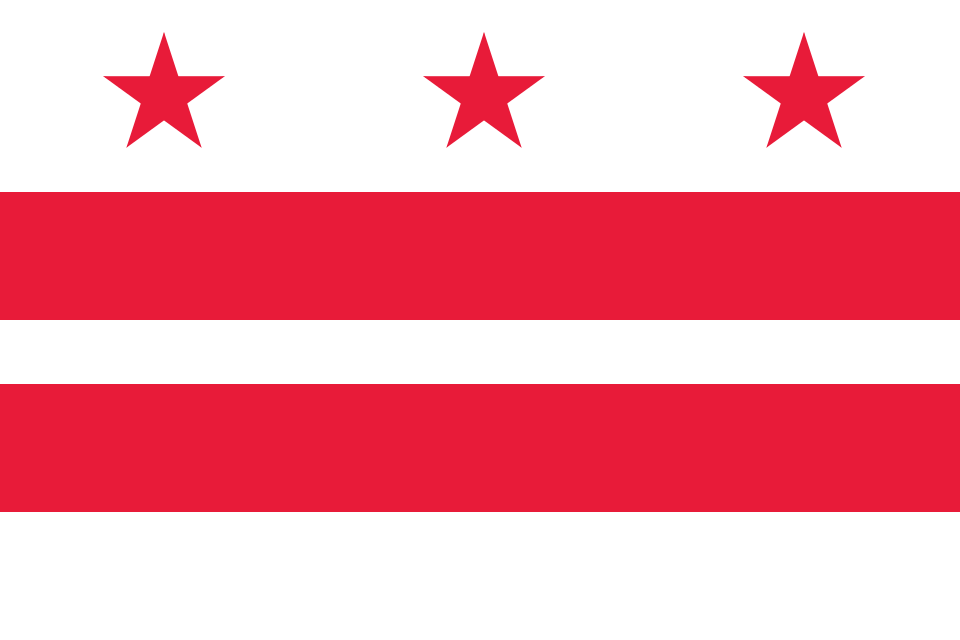
Wage Payment, Minimum Wage & Overtime Laws in D.C.
If you have not been paid properly, you may be entitled to 4x what you are owed under D.C. law.

D.C. Minimum Wage & Overtime Laws
If you have not been paid properly, you may be entitled to substantial compensation under D.C. law.
D.C. has some of the most worker-friendly wage and hour laws in the nation. In D.C., a worker may recover up to 4 times the amount of late or unpaid wages.
And under D.C. law, “unpaid wages” is a very broad concept that can include: regular wages, minimum wages, overtime wages, prevailing wages, living wages, employee classification, unpaid hours worked, off-the-clock work, commissions, bonuses, fringe benefits, unpaid sick leave, unpaid vacation time, and more.
In short: If you have not been paid properly, you may be entitled to substantial compensation under D.C. law.
Wage
Payment Law
District of Columbia
How much am I owed for unpaid wages in D.C.?
D.C. has one of the most generous wage payment laws in the United States. The District of Columbia Wage Payment and Collection Law permits workers to recover 10% of their unpaid wages for each day the wages are late — up to 4 times the amount of wages that are owed — plus attorney’s fees and costs.
What counts as “wages” in D.C.?
The Law defines “wages” very broadly. “Wages” includes unpaid hours worked, bonuses, commissions, fringe benefits, vacation days, prevailing wages, and almost any other type of compensation that might be owed by an employer. Workers who are denied paid leave under the D.C. Accrued Safe and Sick Leave Act may also recover unpaid leave under the Act.
Who does D.C.’s wage payment law apply to?
The wage payment law in the District of Columbia applies to almost all workers employed in D.C., whether or not they might be exempt from minimum wage or overtime laws. From dishwashers to highly-compensated executives, the D.C. Wage Payment and Collection law protects almost everyone.
Looking For A Wage & Hour Attorney?
If you have worked in D.C., and you think your employer owes you compensation of any kind, please contact us to see if you have a claim under the D.C. Wage Payment and Collection Law.
We’re Not Paid Unless You Are.
Minimum
Wage Law
District of Columbia
How much is minimum wage in D.C.?
The District of Columbia Minimum Wage Act is one of the best minimum wage laws in the United States. Under the Act, the D.C. minimum wage increased to $17.50 per hour on July 1, 2024. The act also provides for a gradual increase in the minimum cash wage employers are required to pay their tipped employees so that is eventually equal to the regular minimum wage. As of July 1, 2024, the D.C. “tipped minimum wage” is $10.00 per hour.
Who’s entitled to the D.C. minimum wage?
Many (if not most) employees in the District of Columbia are protected by the Act. (See common exemptions and exceptions.)
My employer pays me the “tipped minimum wage.” Should I be making the regular minimum wage instead?
Many service industry employers pay employees a the lower “tipped minimum wage” when they should be paying the higher regular minimum wage. The law provides a number of complicated requirements for employers to legally pay their employees the “tipped minimum wage.” Many employers do not meet these requirements because they don’t provide adequate notice to their employees, their “tip pool” is structured in an improper way, or other reasons. If you have any doubts about whether your employer is paying you the correct minimum wage, please contact us for a free and confidential case evaluation.
If I’m a salaried employee, am I entitled to the D.C. minimum wage?
Just because an employee receives a salary does not mean he or she is not entitled to the D.C. minimum wage! Generally speaking, if you divide your weekly salary by your weekly hours worked, you should get a number that is equal to or higher than the minimum wage. (See common exemptions and exceptions.)
I was not paid the D.C. minimum wage – what am I entitled to?
Under the District of Columbia Minimum Wage Act, an employer may be liable for up to 4 times the amount of any unpaid minimum wages, plus costs and attorney’s fees. Please contact us for a free and confidential case evaluation.
Minimum Wage in the District of Columbia
$14.00 Effective 7/1/19
$15.00 Effective 7/1/20
$15.20 Effective 7/1/21
$16.10 Effective 7/1/22
$17.00 Effective 7/1/23
$17.50 Effective 7/1/24
(Future increases tied to inflation)
“Tipped Minimum Wage” in the District of Columbia
$4.45 Effective 7/1/19
$5.00 Effective 7/1/20
$5.05 Effective 7/1/21
$6.00 Effective 1/1/23
$8.00 Effective 7/1/23
$10.00 Effective 7/1/24
$12.00 Effective 10/1/25
$14.00 Effective 7/1/26
(Same as regular minimum wage after 7/1/27)
Overtime Law
District of Columbia
Am I entitled to overtime pay in D.C.?
Under the District of Columbia Minimum Wage Act, many (if not most) employees in D.C. are entitled to receive 1.5 times their “regular rate” for any hours they work over 40 in a workweek. Under the Act, an employer may be liable for up to 4 times the amount of any unpaid overtime.
Calculating the correct overtime rate can be difficult, so many employees do not receive the full overtime rate they are entitled to. Also, many employers pay their employees a flat salary when it is unlawful to do so. Because of this, many employees do not know that that they are entitled to overtime.
I am owed unpaid overtime in D.C. – what am I entitled to?
Under the District of Columbia Minimum Wage Act, an employer may be liable for up to 4 times the amount of any unpaid overtime.
In some respects, D.C. overtime law is more generous than federal overtime law under the FLSA — so just because an employee is not entitled to overtime under the FLSA does not mean he or she is not entitled to overtime under D.C. Law. (See common exemptions and exceptions to the D.C. Wage and Hour Law.)
Denied Overtime Pay?
If you may have been unlawfully denied overtime pay, or if you think your employer is not calculating your overtime pay correctly, please contact us for a free and confidential case evaluation.
We’re Not Paid Unless You Are.
Exemptions & Exceptions
District of Columbia
D.C. Exemptions from Both Minimum Wage and Overtime
Babysitters (casual). “Any individual employed as a casual babysitter, in or about the residence of the employer” is not an “employee” covered by the DCMWA. See D.C. Code § 32-1002(2)(C). A “casual babysitter” “means an individual who is employed as a babysitter on an irregular or intermittent basis and whose vocation is not babysitting.” See 7 DCMR § 999.2.
Lay Members of Religious Organizations. “Any lay member elected or appointed to office within the discipline of any religious organization and engaged in religious functions” is not an “employee” covered by the DCMWA. See D.C. Code § 32-1002(2)(B).
Newspaper Deliverymen. “Any employee engaged in the delivery of newspapers to the home of the consumer” is not entitled to minimum or overtime wages under the DCMWA. See D.C. Code § 32-1004(a)(2).
Outside Salesmen. “Any employee employed . . . in the capacity of outside salesman (as th[is] term[] [is] defined by the Secretary of Labor under 201 et seq. of the Fair Labor Standards Act)” is not entitled to minimum or overtime wages under the DCMWA. See D.C. Code § 32-1004(a)(1). An “outside salesman” is an employee who meets the following tests: “(1) Employed for the purpose of and customarily and regularly works away from the employer’s place of business in (a) selling . . . or (b) obtaining orders . . . .” See 7 DCMR § 999.2.
Volunteers. “Any individual who, without payment and without expectation of any gain, directly or indirectly, volunteers to engage in the activities of an educational, charitable, religious, or nonprofit organization” is not an “employee” covered by the DCMWA. See D.C. Code § 32-1002(2)(A).
United States Government Employees. The United States government is not an “employer” for purposes of the DCMWA. See D.C. Code § 32-1002(3).
‘White Collar’ Employees. “Any employee employed in a bona fide executive, administrative, or professional capacity . . . (as these terms are defined by the Secretary of Labor under 201 et seq. of the Fair Labor Standards Act)” is not entitled to minimum or overtime wages under the DCMWA. See D.C. Code § 32-1004(a)(1).
D.C. Minimum Wage Exemptions
Disabled Workers (where DOL certificate). “All workers with disabilities shall be paid at a rate not less than the minimum wage, except in those instances where a certificate has been issued by the United States Department of Labor that authorizes the payment of less than the minimum wage to workers with disabilities under § 214(c) of the Fair Labor Standards Act [29 U.S.C. § 214(c)].” See D.C. Code § 32-1003(d).
Minors. “Individuals under the age of 18 years old may be paid the minimum wage established by the United States Government.” See 7 DCMR § 902.4.
Miscellaneous Acts Setting Other Minimum Wages. Individuals employed pursuant to the Job Training Partnership Act, the Older Americans Act, or the Youth Employment Act, must be paid the wages set forth in those laws. See 7 DCMR § 902.4.
Student-Employees. “Students employed by institutions of higher education may be paid the minimum wage established by the United States Government.” See 7 DCMR § 902.4.
Tipped Employees. Under certain circumstances, tipped employees may be paid a lower hourly rate than the regular minimum wage. See D.C. Code § 32-1002(f) & (g).
D.C. Overtime Exemptions
Airline Employees. “Any employee employed by a carrier by air who voluntarily exchanges workdays with another employee for the primary purpose of utilizing air travel benefits available to these employees” is not entitled to overtime wages under the DCMWA. See D.C. Code § 32-1004(b).
Automobile Dealership Employees. “Any salesman, partsman, or mechanic primarily engaged in selling or servicing automobiles, trailers, or trucks, if employed by a nonmanufacturing establishment primarily engaged in the business of selling these vehicles to ultimate purchasers” is not entitled to overtime wages under the DCMWA. See D.C. Code § 32-1004(b).
Commissioned Employees. Overtime pay is not required under the DCMWA “if the employee works for a retail or service establishment and: (1) The regular rate of pay of the employee is in excess of 1 1/2 times the minimum hourly rate applicable to the employee under this subchapter; and (2) More than 1/2 of the employee’s compensation for a representative period (not less than 1 month) represents commissions on goods or services.” See D.C. Code § 32-1003(e).
Companions for the Aged or Infirm. A worker “[e]mployed as a companion for the aged or infirm” is not entitled to overtime pursuant to DCMWA regulations. See 7 DCMR § 902.5. Note: “[p]ersons who spend more than 20 percent of their time on household work not directly related to caring for the aged or infirm shall not be deemed a companion for the aged or infirm.” See 7 DCMR § 999.2.
Domestic Workers (who live with employer). A worker “[e]mployed as a private household worker who lives on the premises of the employer” is not entitled to overtime pursuant to DCMWA regulations. See 7 DCMR § 902.5.
Railroad Employees. “Any employee employed by a railroad” is not entitled to overtime wages under the DCMWA. See D.C. Code § 32-1004(b).
Seamen. “Any employee employed as a seaman” is not entitled to overtime wages under the DCMWA. See D.C. Code § 32-1004(b).

Fairfax, Va.
We’re Not Paid Unless You Are.



 Wage
Wage Gallery Pl.—Chinatown
Gallery Pl.—Chinatown 